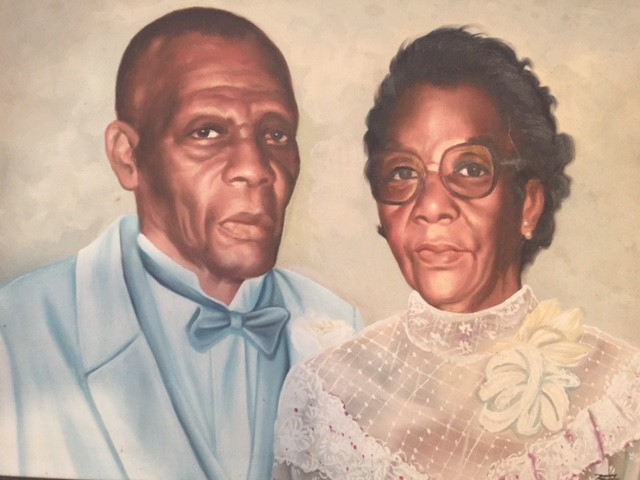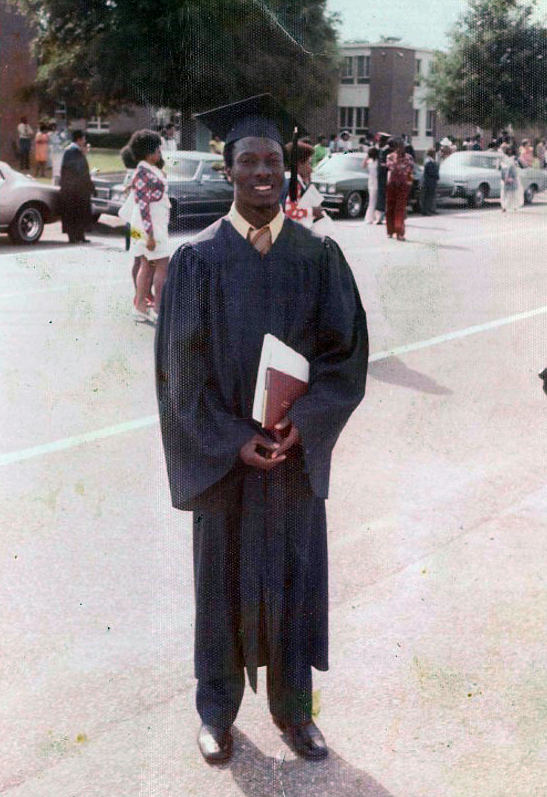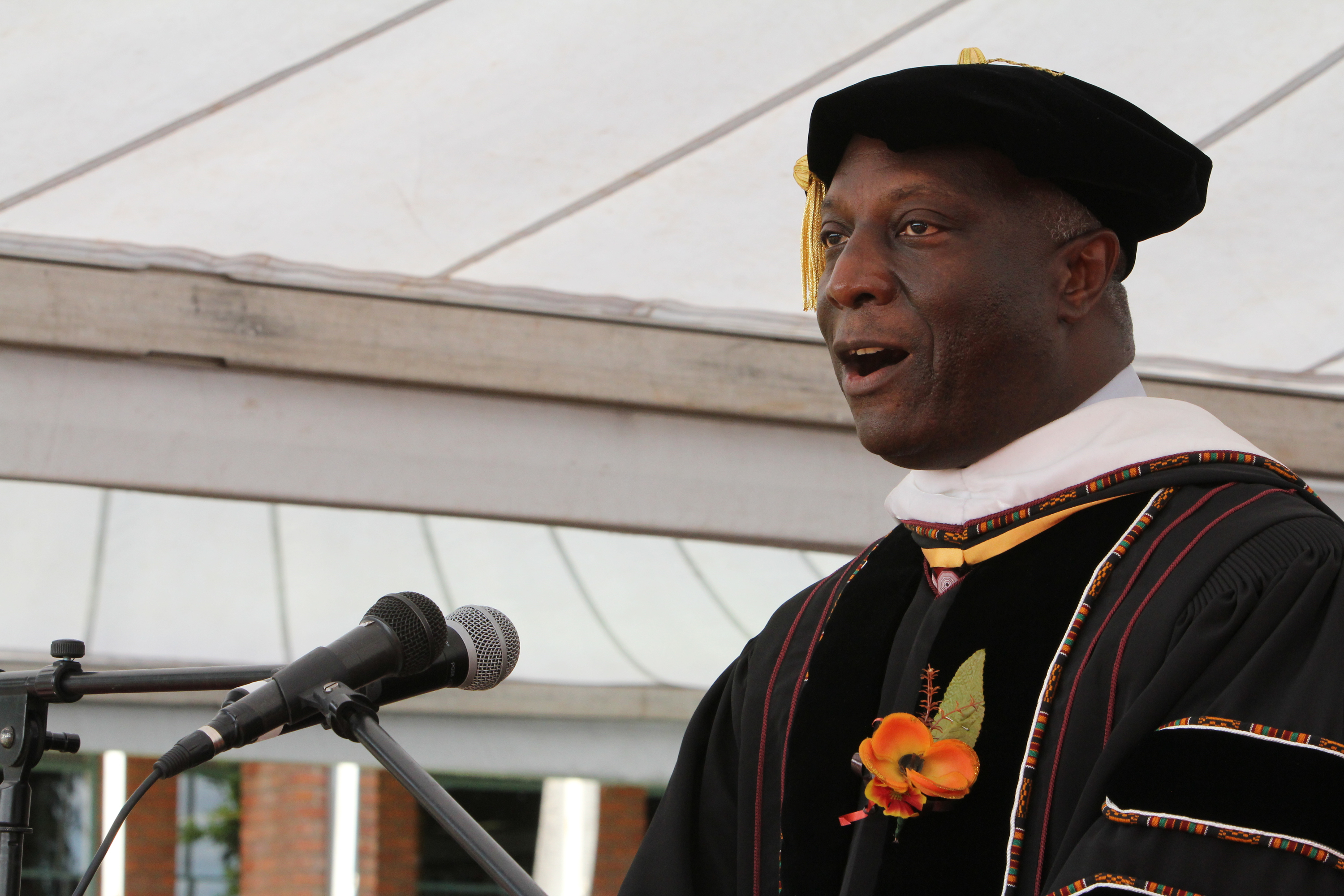Growing up on a small farm in South Carolina, James H. “Jim” Salley never dreamed of becoming the top fundraiser for Africa University, the university founded by the General Conference of The United Methodist Church in Mutare, Zimbabwe.
Nor did he expect to give more than $130,000 to establish an endowed scholarship to honor his parents — Marie and James Salley — and ensure exemplary education for students from across Africa.
But that’s the story.
“My father was a carpenter and small-scale farmer,” recalls Salley, associate vice chancellor for institutional advancement at Africa University. “Mother was a housewife and protector of her children. They both grew up hard. Mother was the daughter of a big-scale farmer whose father and mother made a living from the farm in Allendale County, South Carolina. Grandmother and Grandfather were not sharecroppers. They owned the farm.
“Mama and Dad fell in love, got married, settled in my father’s hometown of Orangeburg, South Carolina, and raised my four sisters and me on a small farm.”
A portrait of James and Marie Salley, parents of James “Jim” H. Salley who has donated more than $130,000 to Africa University for an endowed scholarship in their honor. Photo courtesy of James H. Salley.
They produced much of their food. “We grew sugar cane, made syrup, and everyone in the community received a quart mason jar of syrup,” Salley says. “Vegetables were shared, and if someone was in trouble, [my parents] went to see about them. We were taught to love everybody, and yes, you are your brother's keeper. They sacrificed that we might have a better life.”
They modeled Jesus’ words in Matthew 7:12. “Do unto others as you would have them do unto you.” And they taught by example. “When we learned something,” Salley remembers, “we were encouraged to share.”
Their philosophy? “Education does you no good if you keep the knowledge in your own brain. Get all the education you can to better yourself and help others.”
Salley took their life lessons to heart. He graduated from South Carolina State University, eventually directing institutional advancement at his alma mater.
By 1986, Salley was a director of the United Methodist Board of Global Ministries. In Nairobi, Kenya, he participated in initial conversations about establishing a United Methodist university in Africa. Later, as a member of the site-selection committee, Salley helped plan and present the project to the 1988 General Conference. Delegates approved the proposal.
Israel Kamudzandu was one of the first students at the new university. After training as a teacher at Nyadire Mission, east of Harare, he was encouraged by Bishop Christopher Jokomo to enroll in the Faculty of Theology. When he did so, in 1993, Kamudzandu was one of 14 students in the faculties of theology and agriculture.
Most of his professors were missionaries from the United States, with a few from Africa. “My first week at Africa University opened a new vision … that would see me embracing the global village,” Kamudzandu recalls. “It was a dream come true. Africa University became a place of new dreams, not just for me, but also for many students from all over the continent of Africa.”
His introduction to Salley made a lasting impression.
James H. Salley graduated from South Carolina State University, eventually directing institutional advancement at his alma mater. Photo courtesy of James H. Salley.
“Right away,” he says, “students fell in love with him. With his oratory voice, we were all convinced that the continent of Africa, through him, was never going to be the same.”
Kamudzandu credits Salley with being a grassroots organizer, strategic thinker and “the first person to clearly communicate the mission and vision of Africa University.” Salley also developed a public relations program to communicate that vision and a compelling, comprehensive fundraising program.
Today, Kamudzandu is an associate professor at Saint Paul School of Theology, Leawood, Kansas. He is confident that without Salley, he never would have earned a theological degree and, eventually, a doctorate and has shared his story with potential donors.
“My parents would have been unable to pay for my education at Africa University,” he says, calling his life, “a testimony to the work, energy and networks of Mr. Salley.”
Salley become AU’s associate vice chancellor for institutional advancement in 1992 and has been on the Mutare campus at least 114 times.
With his leadership, Africa University has grown from 40 students in renovated farm buildings to 1,600 students, with more than 8,000 graduates and 44 modern buildings. The university endowment fund now stands at $77.5 million.
The typical student, Salley notes, is “a first-generation university attendee, rural, multilingual after the first year, international after the second, with a hunger for knowledge and a will to change Africa and the world. The students are ethically and morally grounded and have a different air about them.”
“More than 90 percent of our graduates remain on the continent of Africa, and we have a 96 percent graduation rate,” Salley says.
The average annual cost for an undergraduate Africa University student is less than $6,000. Yet, most aspiring students come from African countries where the average income ranges from 46 cents to $2 a day.
Endowed scholarships are crucial. “Ten thousand dollars,” Salley explains, “endows a named scholarship in perpetuity. The $130,000-plus that I have provided assures that a student matriculates under the name of Marie and James Salley throughout the life of the institution. The interest earned from the gift is given as a scholarship to the students.” The principal is never touched.
James H. Salley, associate vice-chancellor for institutional advancement for Africa University, speaks during the 20th anniversary celebration of Africa University on March 23, 2013. Photo by Kathleen Barry, UMNS.
Don Fowler, a political scientist at the University of South Carolina and a member of Washington Street United Methodist Church in Columbia, said it’s not uncommon “for rich folks to make large gifts.
“But James Salley is not a rich person. For him to have accumulated these funds, devoted them to such a worthy cause, and do so in honor of his parents who were such wonderful people, is very inspiring and truly rare,” Fowler said.
Salley’s commitment doesn’t begin and end with Africa University, however. Historically black colleges and universities are also his passion and he has raised and enabled millions in funding for those schools.
The Rev. Whittaker V. Middleton is vice president of institutional advancement at Claflin University, one of United Methodism’s historically black institutions.
“He is a loyal supporter of Claflin University and holds an honorary degree from the institution. A few years back, Mr. Salley helped Claflin win a $1 million award from the Peter D. and Eleanor A. Kleist Foundation,” Middleton said.
Salley’s gift to AU “tells us where his heart is,” Middleton says.
Such a generous gift of an endowed scholarship may seem impossible to many.
“Give what you have,” Salley advises, “and trust God to provide the increase. Give from the heart and do the best you can. Give cheerfully because God loves a cheerful giver.”
Grace Muradzikwa, now in her second term on the Africa University board, says Salley “is walking the talk.” His gift “will make him even stronger in his advocacy work for the university.”
Lisa Tichenor, involved in Africa University since 1989, agrees.
“This generous gift,” says Tichenor, “is a capstone on the lifetime of service Jim has provided for AU. His parents are clearly among the most important people in his life, honored by a gift directed to the most meaningful work of his life.”
Barbara Dunlap-Berg, a retired writer and editor for United Methodist Communications, lives in Carbondale, Ill. News media contact: Vicki Brown at (615) 742-5470 or [email protected]. To read more United Methodist news, subscribe to the free Daily or Weekly Digests.
Like what you're reading? Support the ministry of UM News! Your support ensures the latest denominational news, dynamic stories and informative articles will continue to connect our global community. Make a tax-deductible donation at ResourceUMC.org/GiveUMCom.







